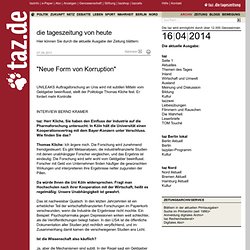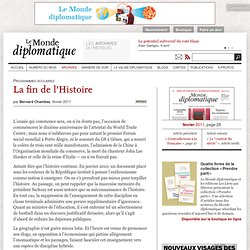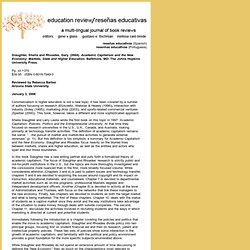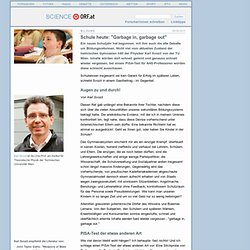

Teaching Was Considered a Profession, But Then Came Standardization, Tests, & Value-Added Merit Pay Schemes... ["since we can’t measure what we care about, we start to care about what we can measure"] #Chile students' #protests 2011 #education 02mySocActi_201109_no. "Neue Form von Korruption" - taz.de. UNILEAKS Auftragsforschung an Unis wird mit subtilen Mitteln vom Geldgeber beeinflusst, stellt der Politologe Thomas Kliche fest.

Er fordert mehr Kontrolle taz: Herr Kliche, Sie haben den Einfluss der Industrie auf die Pharmaforschung untersucht. In Köln hält die Universität einen Kooperationsvertrag mit dem Bayer-Konzern unter Verschluss. Wie finden Sie das? Thomas Kliche: Ich ärgere mich. Da würde Ihnen die Uni Köln widersprechen. Das ist nachweisbar Quatsch. The Neoliberal University. Recently published a scathing report on Rutgers’ spending on its athletic program and its effect on academic departments. The administration has consistently increased the size and scope of these programs, despite its claims about budget crises that they have used to justify wage freezes for faculty and staff. It’s common among contemporary political economists to discuss the impact of neoliberalism on the university and the attendant policy changes it brings to schools. One aspect I noted recently in a conversation with my brother was that of the university’s own funding structure mirroring the developments in the economy at large.
University executives, facing austerity from state and federal programs, are in a rush to bring money into their schools. With Gov. While the share of advertising dollars is not as high as the share of the economy that finance capital enjoys, even at universities with large sports, the two kinds of capital operate in structurally similar ways.
The Neoliberal University. La fin de l'Histoire. La fin de l’Histoire, par Bernard Chambaz. L’année qui commence sera, on n’en doute pas, l’occasion de commémorer le dixième anniversaire de l’attentat du World Trade Center ; mais nous n’oublierons pas pour autant le premier Forum social mondial à Porto Alegre, ni le sommet du G8 à Gênes, qui a nourri la colère de trois cent mille manifestants, l’admission de la Chine à l’Organisation mondiale du commerce, la mort du chanteur John Lee Hooker et celle de la reine d’Italie — on n’en finirait pas.

Autant dire que l’histoire continue. En janvier 2010, un document placé sous les couleurs de la République invitait à penser l’enthousiasme comme notion à enseigner. On ne s’y prendrait pas mieux pour torpiller l’histoire. Au passage, on peut rappeler que la mauvaise mémoire du président Sarkozy est aussi notoire que sa méconnaissance de l’histoire. En tout cas, la suppression de l’enseignement de cette discipline en classe terminale administre une preuve supplémentaire d’ignorance. Via The goose-step : a study of American education. The goose-step : a study of American education : Sinclair, Upton, 1878-1968. By Slaughter, Sheila and Rhoades, Gary. (2004).
Education Review-a journal of book reviews. Slaughter, Sheila and Rhoades, Gary. (2004).

Academic Capitalism and the New Economy: Markets, State and Higher Education. Baltimore, MD: The Johns Hopkins University Press. Pp. xii +370 $39.95 ISBN 0-8018-7949-3 Reviewed by Rebecca Barber Arizona State University January 3, 2006 Commercialism in higher education is not a new topic; it has been covered by a number of authors focusing on research (Etzkowitz, Webster & Healey (1998)), interaction with industry (Soley (1995)), marketing (Kirp (2003)), and sports-related commercial ventures (Sperber (2000)). Sheila Slaughter and Larry Leslie wrote the first book on this topic in 1997: Academic Capitalism: Policies, Politics and the Entrepreneurial University.
In this book Slaughter has a new writing partner and puts forth a formalized theory of academic capitalism. Immediately following the introduction is a chapter covering the policies and politics that enable the move to academic capitalism. References. Rhoades.qxp.pdf (application/pdf-Objekt) Google books - complete: Academic capitalism and the new ... "Wie können wir uns damit abfinden, dass unsere Schulen zu Produzenten von pot..." Schule heute: "Garbage in, garbage out" APA - Helmut Fohringer Ein neues Schuljahr hat begonnen, mit ihm auch die alte Debatte um Bildungsreformen.

Nicht viel vom aktuellen Zustand der heimischen Gymnasien hält der Physiker Karl Svozil von der TU Wien. Inhalte würden dort schnell gelernt und genauso schnell wieder vergessen, bei einem PISA-Test für AHS-Professoren würden diese schlecht ausschauen. Schulwissen insgesamt sei kein Garant für Erfolg im späteren Leben, schreibt Svozil in einem Gastbeitrag - im Gegenteil. Augen zu und durch! Karl Svozil ist Ao.Univ.Prof. am Institut für Theoretische Physik der Technischen Universität Wien. Von Karl Svozil Diesen Rat gab unlängst eine Bekannte ihrer Tochter, nachdem diese sich über die vielen Absurditäten unseres sekundären Bildungssystems beklagt hatte. Das Gymnasialsystem erscheint mir als ein einziger Krampf: überteuert in seinen Kosten, horrend ineffektiv und verhasst bei Lehrern, Schülern und Eltern. Die Folgen der Exzellenzinitiative – Funktionale oder vertikale Differenzierung. Im Juni nächsten Jahres werden die letzten Entscheidungen im Rahmen der Exzellenzinitiative verkündet.
Der 2005 gestartete Wettbewerb läuft 2017 endgültig aus. Die Folgen der Exzellenzinitiative – Funktionale oder vertikale Differenzierung